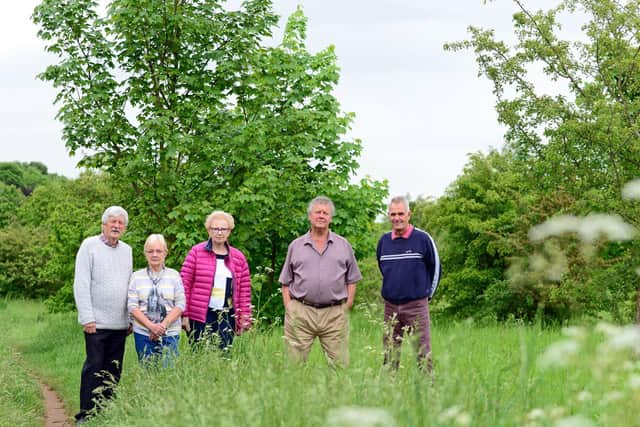Meet the campaigning Yorkshire retirees who are fighting to save a rewilded field from becoming a large housing estate
Families and dog walkers taking their daily exercise had suddenly discovered a hidden gem on their doorsteps - a former arable field which has naturally 'rewilded' since a farming tenancy ended nearly 30 years ago and which is now on the brink of being sold to a major developer.
The Rose Hill field, which borders Doncaster Racecourse, Sandall Beat Woods and a railway cutting for a partially disused colliery line, has become emblematic of a wider debate around the future of our green spaces and one which has captured the imagination and passion of a demographic new to environmental campaigning.
Advertisement
Hide AdAdvertisement
Hide Ad

The field, criss-crossed by bridleways and surrounded by ancient oak trees, lies at the rear of the Rose Hill estate, and is the last remnant of a larger farm which was operational until housebuilding first began. The oldest houses date back to the Edwardian period, but most are post-war bungalows home to affluent retirees living in a peaceful enclave that is just a short drive from Doncaster town centre.
The semi-rural location - within the Bessacarr ward, popular with aspirational young buyers - has caught the eye of Miller Homes, who have taken advantage of the field's sudden inclusion in the Local Plan to propose an exclusive development of 157 new homes. First identified as future housing land in the 1990s, it was protected for several years during a local moratorium on building on greenfield sites in the mid-2000s - but is now one of several parcels of Doncaster Council-owned land being disposed of, and they first marketed it to developers in 2017.
As Wendy Wright, whose home on The Avenue overlooks the field where mature trees now stand, points out, she and her fellow campaigners from the Rose Hill Residents Association are very much 'ordinary people' of the sort who would not have been actively involved in green issues in the past, when they were seen as fringe concerns. A retired teacher, she and her husband Geoff first moved onto the estate in 1984 before downsizing to a bungalow after their daughters had left home.
She has seen the field change considerably after it was left fallow following the end of agricultural ploughing in around 1995 - to the extent that it has now become a wildlife habitat home to foxes, deer and bird life. Trees and shrubs have germinated naturally where crops once grew.
Advertisement
Hide AdAdvertisement
Hide AdThe group first held an AGM four years ago when the field was put up for sale, and since then they have garnered significant support, and have already achieved some success - the oaks have been issued with protection orders and three bridle paths registered, meaning they must be retained for future access to the woods. Their ultimate goal is to prevent the field from ever being developed.
"It was first suggested for housing in the mid-1990s and there have been objections in the past, but when Peter Davies was mayor, he said it would never be built on - and to his credit, it never was. It is now a completely rewilded area with quite a lot of mature trees. To destroy it would go against all of the current mayor, Ros Jones', policies for a greener Doncaster."
Wendy jokes that she hopes the discovery of a Roman mosaic floor or a protected species of bat could be their salvation - and the site does have considerable archaeological significance, having been a Roman pottery kiln and a Victorian waste dump during its history. Miller Homes have already begun ground surveys, despite not having submitted their planning application, in anticipation of historical finds.
"There has been all sorts going on there over the years. We really don't want to lose this asset, as we have nothing else. The racecourse is private land, but this is natural, wild habitat that needs to be kept as it is. If we lose it, where will we stop?
Advertisement
Hide AdAdvertisement
Hide Ad"It's a lovely area, very peaceful, and many people didn't know the field existed until lockdown when they came here to get to the woods."
The action group hopes to secure a public meeting with Miller Homes, and point out that they are not willing to accept a compromise, as even a considerably reduced number of homes would still lead to major habitat loss. Their other key concern is traffic, with an estimated 300 additional cars using the estate's sole exit and no nearby public transport links to local schools.
"There is so much more awareness now, and many grandparents like us are so worried about children's futures. Years ago it was more of an 'eco warrior' thing, but now these issues are in the public domain so much more and ordinary people are getting involved. We've had support from the local Conservative councillors, but we want to get a cross-party alliance going.
"Losing this field would be a real tragedy."
Doncaster Council's response
Dan Swaine, director of economy and environment, said: “The Doncaster Local Plan has been through a robust and comprehensive process over a seven-year period to reach the milestone of now being ready to adopt, including being examined in public by a government-appointed inspector and been found to be ‘sound’ and ‘legally compliant’.
Advertisement
Hide AdAdvertisement
Hide Ad“The Rose Hill site is an existing development opportunity that has been identified for development since 1998 via the Unitary Development Plan.
“Objectors had further opportunity to engage in the Local Plan process when the council published the draft Plan in August 2019.
“Objections to some of the housing sites in the plan, including Rose Hill, were made and discussed in front of the government-appointed planning inspector. The Inspector was fully aware of local opposition to the Rose Hill site being re-allocated for housing when he considered the soundness of the plan.”
